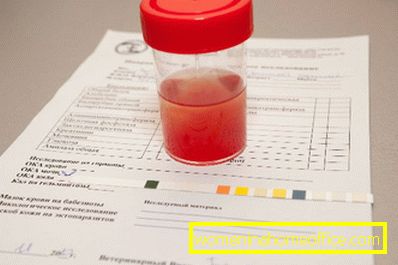Erythrocytes are increased in urine
Everyone knows that blood contains a huge number of red blood cells, because they are its main elements. That is why the presence of red blood cells in the blood does not cause concern. What to do if red blood cells are elevated in the urine? What diseases can this indicate? Let's look at these issues in detail.
What are the types of red blood cells in the urine?

The reaction of urine, as well as the proportion of red blood cells contained in it, affects the appearance of the blood bodies. In total there are several types of red blood cells:
- unchanged;
- altered.
The duration of the stay of erythrocytes in the urine can be determined by the ratio of the number of modified and unchanged blood bodies. If red blood cells are in the urine for a long time, they become dull, because the acidity of urine affects the rate of their discoloration.
Fresh bodies are the result of diseases of the urinary system. Among the most common diseases are:
- cystitis;
- the passage of stones;
- prostate swelling.
Leached red blood cells are caused by a variety of renal diseases. The main sign of their origin is the appearance of cylinders and protein in the urine.
Norm indicators
First of all, it should be noted that the indicators of the normal content of red blood cells in the urine of men, women and children are different. So, if a man does not suffer from any diseases, then the rate of red cells in urine ranges from 0 to 1.
In the fair sex, this indicator is slightly higher: from 0 to 3 red blood cells. It is important to know that the rate of red blood cells does not change in women with the onset of pregnancy. If red blood cells are elevated in the urine during pregnancy, then this may be evidence of the occurrence of pathological processes in the body. That is why a urine test for the number of red cells should be taken regularly in order to identify the disease in time and start treatment.
The number of erythrocytes is normal in children's urine more than in adults. It is up to four blood bodies. When red blood cells are elevated in the urine of a child, this is evidence of hematuria.
Causes of increased red blood cell levels
Among the diseases that cause an increase in the number of red blood cells, it is worth highlighting:
- renal diseases;
- diseases of the bladder or urethra;
- diseases of the organs that affect blood formation.
Kidney Diseases:

- glomerulonephritis - red blood cells appear in the urine due to the fact that the kidneys do not filter the blood well enough;
- kidney stones - when the sharp edges of the stones touch the inside of the kidney, bleeding occurs;
- swelling - when it grows, the vessels of the body can be damaged;
- hydronephrosis - urine goes bad and stretches the kidneys, injuring their surface from the inside;
- pyelonephritis - inflammatory processes occur that affect the permeability of blood vessels, with the result that red blood cells begin to get inside;
- injuries of a different nature.
Diseases of the bladder or urethra:
- stones, traumatic vessel;
- injuries;
- inflammation of the mucous membrane, during which the red blood cells fall inside through the walls of blood vessels;
- swelling of the urethra or bladder - increasing, it dilates the blood vessels.
Pathology of other organs
When red blood cells increase in the urine, the reasons may be as follows:
- viral or bacterial infections that provoke intoxication;
- hemophilia is a violation of normal blood clotting;
- prostatitis - a male disease in which the prostate gland inflames;
- oncological diseases - most often the prostate gland is affected;
- erosion of the uterine cervix - a female disease, in which the vessels are destroyed, as a result of this process blood may enter the urine;
- bleeding of the uterus.
Causes of external exposure

It is clear that red blood cells are not always a sign of serious pathology. There are many factors that cause an increase in red blood cells in urine in healthy people:
- stresses, under the influence of which the walls become permeable;
- drinking large amounts of alcohol - it additionally narrows the blood vessels of the kidneys;
- heatwave;
- serious physical exertion.
What to do if red blood cells are elevated in the urine?
First of all, you need to identify a disease that provokes an increase in red blood cells in the urine, and then to treat it. As a rule, the following methods are used in treatment:
- antibiotic therapy;
- diet therapy;
- anti-inflammatory therapy;
- the use of diuretic drugs, if there are stagnant urine;
- limiting the amount of fluid consumed to reduce the renal load;
- surgery if cancers, urolithiasis or trauma were found.
Remember that only a doctor can make the correct treatment regimen for the disease, which has led to an increase in urine red blood cells. If the pathology is diagnosed in time and the treatment is started, then the complicated consequences can be avoided. Take care and be healthy!